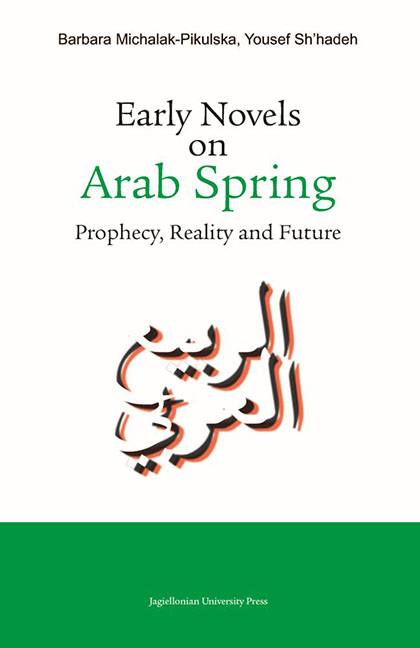Book contents
- Frontmatter
- Contents
- Introduction
- Part I Awakening of the Awareness of Subjugation – The Prophecy of the Spring of Nations in Arab Novels
- Part II At the Heart of the Arab Spring Events
- Part III The Future: The Spring Continues
- 17 Mu‘Taṣim Aš - Šā‘Ir : Uhzūǧat ar-raḥīl (A Song of Departure) and Fī intiẓār as-sulaḥfāt (Waiting for a Turtle)
- 18 Aḥmad ‘Abd Al - Malik : Al-Aqni‘a (Masks)
- 19 Ṭayba Aš - Šarīf Al - Idrīsī : Ḥaǧar min saqar (A Stone from Hell)
- 20 Amīra Aš - Širbīnī : ‘Itq (Liberation)
- 21 ‘ Izz Ad - Dīn Šukrī Fašīr : Bāb al-ẖurūǧ – risālat ‘Alī al-muf‘ama bi-bahǧa ġayr mutawaqqa‘a (The Gate to Leave – Ali’s Letter Filled with Unexpected Joy)
- Conclusion
- Bibliography
- Summary in Arabic
Part III - The Future: The Spring Continues
Published online by Cambridge University Press: 13 October 2023
- Frontmatter
- Contents
- Introduction
- Part I Awakening of the Awareness of Subjugation – The Prophecy of the Spring of Nations in Arab Novels
- Part II At the Heart of the Arab Spring Events
- Part III The Future: The Spring Continues
- 17 Mu‘Taṣim Aš - Šā‘Ir : Uhzūǧat ar-raḥīl (A Song of Departure) and Fī intiẓār as-sulaḥfāt (Waiting for a Turtle)
- 18 Aḥmad ‘Abd Al - Malik : Al-Aqni‘a (Masks)
- 19 Ṭayba Aš - Šarīf Al - Idrīsī : Ḥaǧar min saqar (A Stone from Hell)
- 20 Amīra Aš - Širbīnī : ‘Itq (Liberation)
- 21 ‘ Izz Ad - Dīn Šukrī Fašīr : Bāb al-ẖurūǧ – risālat ‘Alī al-muf‘ama bi-bahǧa ġayr mutawaqqa‘a (The Gate to Leave – Ali’s Letter Filled with Unexpected Joy)
- Conclusion
- Bibliography
- Summary in Arabic
Summary
Arabs, despite decades of dictatorship, have not ceased to dream of freedom and normality. The years of their struggle are an expression of the heroism of those who have put their lives at risk for the common good. You cannot justify vileness and injustice – you should fight it even at the price of your own life. Writers in their novels show the repetition of history in Egypt or Tunisia and the immutability of human reactions to suffering and humiliation. The Arab Spring revolutions are a heroic act of courage. Revolutionaries who have crossed the barrier of life and death cannot return to the past, to what was, to dictatorship.
Arab novelists depicted the reality of their societies – rebellious against the regimes, trying to paint a picture of the future of the Arabs and what the Spring Uprisings could lead to. The writers presented various visions of the future resulting from the process of changes that started to take place in the Arab world. For this, we have chosen six novels written by five authors: Uhzūǧat ar-raḥīl (A Song of Departure) and Fī intiẓār as-sulaḥfāt (Waiting for a Turtle) by Mu‘taṣim aš-Šā‘ir, Al-Aqni‘a (Masks) by Aḥmad ‘Abd al-Malik, Ḥaǧar min saqar (A Stone from Hell) by Ṭayba aš-Šarīf al-Idrīsī, ‘Itq (Liberation) by Amīra aš-Širbīnī, and Bāb al-ẖurūǧ – risālat ‘Alī al-muf‘ama bi-bahǧa ġayr mutawaqqa‘a (The Gate to Leave – Ali’s Letter Filled with Unexpected Joy) by ‘Izz ad-Dīn Šukrī Fašīr.
- Type
- Chapter
- Information
- Early Novels on Arab SpringProphecy, Reality and Future, pp. 121Publisher: Jagiellonian University PressPrint publication year: 2022



